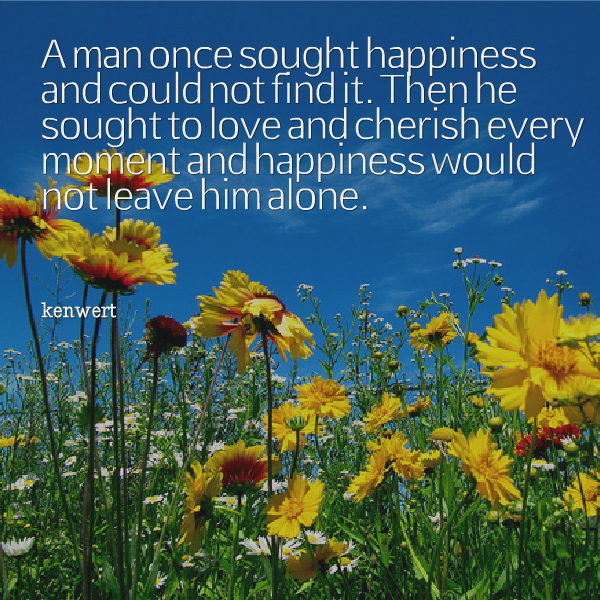
“Most of our assumptions have outlived their uselessness.” ~Marshall McLuhan
But are all assumptions useless? I know, I know, I still remember my 6th grade teacher telling us what happens when we assume (Hint: It makes the first three letters of the word out of “u” and “me”).
Still, is there nothing we can assume in life? Is there nothing we can take for granted? Are we to truly see each and every experience as if it were wholly unique unto itself, unrelated and unrelatable to any other past or future experience?
It turns out that some assumptions are quite helpful as we navigate the rough waters of life. In fact, I make the following 7 every day of my life and have for the last couple decades, at least. The effect has been greater emotional health, deeper levels of happiness and more meaning and direction in my life. Try them on for size to see if they do the same for you.
7 Happiness-Inducing Assumptions
1. I assume there is a God Who loves me.
All expressions of faith are, in a way, spiritually informed assumptions we make about eternity, about religious or spiritual principles, about what exists beyond the realm of the scientifically provable. But such assumptions have a profound effect on what we think about the meaning and purpose of life, why we exist and what we’re doing here and what’s next.
They are more significant to an individual’s life and how it’s lived than laws of gravity or theories of evolution. They give substance to the decisions we make and elevate the context and meaning of our choices.
By assuming a God and assuming His love for me, I have a hard time undervaluing myself. Or others. My worth (and yours) is eternal, inherent and sublime. That’s not a bad position from which to face the choppy waters of life.
2. I assume what I do matters.
Whether I keep at it or give up matters. Whether I cheat or cut corners matters. Whether I’m honest in my dealings with others matters. It matters to me. It matters to them. It matters to my family. It even matters to humanity and the collective cause of human decency. And it certainly matters to God. And it matters to our happiness as well.
My honesty at work, my integrity at school, my faithfulness at home, what I do in the light of day or under the veil of night, in solitude, behind closed doors, all matters profoundly because it speaks to the heart and soul of who I am.
It’s the measure of my character. It’s the foundation of my life. It’s the substance of what’s most important to me. It’s the context and framework of who I am at a most fundamental level. And it’s the root system to the happiness I experience from day to day.
Incidentally, what I don’t do reveals just as much about my soul as what I do. I can pass or persevere, give up or give it all I’ve got, live a life of selfishness and greed or one of meaning and purpose, integrity and compassion. But at the bottom line of these beliefs is the assumption that it all matters.
3. I assume who I am matters.

How I live my life, the character I forge, the values I live by, the virtue I stand for, the honor I defend, the way I treat others all have tremendous meaning and significance. It’s an assumption I’m not willing to let go of.
It informs the goals I set, the standards I aspire to live by, the work that I do and the way I interact with others, the nature of the happiness I live with. Believing down in my guts that who I am matters helps me be a better parent and husband and son and brother and friend and neighbor.
4. I assume people are both decent and indecent.
I’ve always taken it for granted that some people will treat me well and others simply won’t. Some will be kind and some struggle with that trait. Some people are compassionate and others are mean-spirited. Some people give to those in need and some rob banks. Some are rude and others are sweet and thoughtful. And sometimes you and I fluctuate between the kind and the not-so-kind as well.
Humanity is a mixed bag. Accepting that fact solves a whole lot of heartache that believing otherwise would otherwise create. So when I encounter rude people, I’m not offended, crushed, confused or angry. Instead, I smile, shrug and move on to someone else. I don’t dwell on offenses or ruminate on perceived unfriendliness or question my likeability or God’s justice or their decency.
After all, I assume there will be both kind and rude people and sometimes kind people will be rude and sometimes rude people will be kind and sometimes I may even find myself somewhere in between the two. That assumption keeps me sane.
5. I assume personal imperfection, not as an excuse, but as a reality.
Somewhere in the course of the day, I’m going to mess up, do the wrong thing, say the wrong thing, fail to do the right thing, fail to say the right thing, or engage in some combination of all the preceding.
And on a particularly human day, I’ll mess up on all 4 of those possibilities at the same time. It’s a given. That assumption allows me at the same time to be vigilant at personal development, tolerant of others’ weaknesses and forgiving of my own moral face-plants and sincerely happy even in the midst of mistakes and mess-ups.
6. I assume there will be good and bad days.

If one day is challenging, all I have to do is wait for the tide to change, circumstances to shift, the next day to come. Things will get better. They always do. Then, when new challenges come, we will have learned something from the last time that makes weathering new storms easier.
But even if we learn nothing, the assumption that things will improve allows us greater emotional equanimity even in the middle of what would otherwise be emotional turbulence.
7. I assume the world will work just about the way it usually works.
The earth will spin. Gravity will keep me grounded. The laws of physics will still apply in most instances most of the time. And life will do what it typically does. The sun will set tonight and rise in the morning. Summers will warm and winters will cool and the tide will ebb and flow. There is a pattern of predictability that lends my life a sense of stability even when all else seems to be falling apart.
That assumption keeps me afloat when the winds pick up and the waves start to pound relentlessly. Knowing this, believing this, taking it for granted helps me keep my head up, my feet kicking and my arms paddling toward shore, knowing that in the end, all will be okay.
The Necessity of Assumptions (for life, peace and happiness)
If I can’t make a few basic assumptions about life, if each and every possibility suddenly becomes equally likely, if there were no guiding principles I was able to count on, and there ceased to be any predictability to any experience I ever had, every moment would be fraught with stress and happiness would be much more fleeting.
Think about it.
If absolutely nothing can be assumed, then every decision is monumental. Every moment is filled with possible collapse. Nothing can be set on autopilot and the mental muscles have to remain flexed at all times.
But when muscles never relax, they weaken and stiffen and fail. I don’t know about you, but I’ll accept an occasional “I-told-you-so” from someone who recites the “ass out of u and me” platitude just to add a little predictability to my life. Not cement. Just a degree of assurance that tomorrow the laws of the universe will still be in operation.
Your turn …
- What do you think? The usual advice is to get rid of assumptions, so this may be new to you. But does it ring true?
- I would love to get your thoughts in the comments!
The Daily Thought
To get daily shots of inspiration, go LIKE my new Facebook page, The Daily Thought!
Here’s a sample of what you’ll get posted to your wall every morning when you LIKE my page:











































[…] 7 Assumptions Happy People Make […]
So no god = no happiness?
Hi Karen. Sorry for the late reply here, but wanted to respond. No, there are plenty of people who believe in God and are miserable. And there are plenty of people who don’t and are happy. But happiness is on a continuum, just like most of life is. Health, for instance, is on a continuum too. If I wrote that those who frequent gyms are healthier people than those who don’t, it would be an accurate statement even though not necessarily true and decidedly not true in every circumstance. But those working out would be healthier than those who don’t even if there are many people who are very healthy because of sports or martial arts or yoga or weights at home.
Still, study after study has identified the same thing: People who are church goers register happier than non church goers. This is simply the data. What I am suggesting are a few reasons why that’s true. Some of the answer is likely in the friendships and camaraderie that regular church attendance reinforces. But I believe some of the answer is in the specific things believed. Those beliefs are what I was conveying in the post.
So believers have an advantage over non-believers, but certainly no monopoly on happiness.
Does that make sense? Thanks for the comment, making me clarify what I hoped to say in the body of the post!
https://www.psychologytoday.com/blog/the-human-beast/201302/do-religious-people-really-live-longer
I just wanted to link this as a counter to your first point.
The purported link between believing in God and health is far more murky than you make it out to be – and of course one should avoid the fallacy of argument from consequence, where just because you’d like something to be true/it makes you happy, it is actually true. Not to mention it doesn’t answer what God is like, and whether anyone on earth knows his mind…
I, for example, can’t really openly discuss my non-belief with my father, for example, because of our ethnic (armenian-of which the vast majority are christian) culture (my mother and brother are reasonable about it to be fair), and certainly not at any major gathering. It’s likely my experience isn’t unique – and probably mild by comparison. You would probably find armenian nonbelievers to be, on average, leas healthy – but it wouldn’t be the religion in itself, but the negative consequences, which aren’t inherently due to the nature of nonbelief, but because of societal pressure and isolation.
Some of the rest of your aasumptions don’t need to be assumptions either – any life experience clearly shows some days are good and bad, and that people have both good and bad in them (to varying degrees – with some outliers eg paychopaths/sociopaths) – of course, the assumption here is present in the philosophical problem of induction – but I think most educated people know of this problem well.
Hey there AK. Haven’t been back to this post in years. Actually haven’t been very active on the blog much at all the last couple years. In short, sorry for the lapsed time between your comment and my reply.
Let me start with your last point first. I agree that most people know that some days will be good and others not so much. But my post wasn’t about the assumptions not many people have ever thought about before, but about those assumptions that as true assumptions, make life easier, more tolerable and even happier, whether obvious or not.
Besides, an intellectual acceptance of a thing does not always have the happy effect we want if our emotional reaction proves the passive acceptance was at best a very soft assumption, not one than actually animated our response to the bad day.
Having said that, since there seem to be a growing number of people today who feel personally assaulted and offended by life when it doesn’t hand-deliver what they expected to have after some self-imposed deadline (I see this a lot on college campuses these days), I’m not convinced my list of assumptions–even obvious that some days are good and others bad–are truly accepted as a truism by as many as you think.
To your first point, religion is a complicated and complex set of propositions and experiences. So to parse out what aspects of a religious experience is responsible for how much happiness and which parts are responsible for how much guilt and anxiety, is at best, a difficult proposition.
In part, that’s why I said nothing about religiosity and focused on just one aspect of a God-based belief system: Inherent meaning. It seems a hard sell to say that a belief system that claims we are all inherently valuable and that others have inherent value as well does not influence the believers’ sense of purpose and meaning, confidence and happiness. It also seems pretty self-evident that believing there is an ultimate reason for personal growth would make personal growth a more internally motivated focus of life.
I don’t disagree with what you said about your personal experience with Armenian culture/religion/family response. But none of that, it seems to me, negates anything I wrote. Truly believing God loves me despite my weaknesses and faults is a very empowering idea. That seems self-evident to me.
Thanks for the challenge!